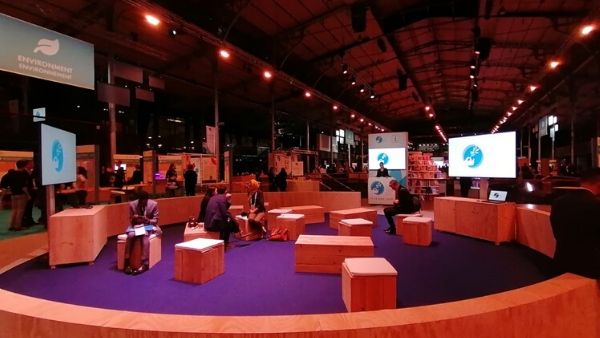When I was informed that I had been invited to the Paris Peace Forum to present a project in relation to Artificial Intelligence for the prevention of violence against women, I was delighted! The project was something that was very close to my heart as well as something that Amilcar Romero, the founder of Ankawa International, who initiated and developed the project alongside me was very passionate about.
The Peace Forum unites hundreds of speakers from around the globe, representing a variety of sectors – local and national governments, international organizations, NGOs, large companies, charities, academia, media, etc. Everyone, from high profile personalities, project leaders and actors of civil society, takes part in open dialogue, standing united in diversity as they discuss solutions to the world’s problems. Everyone works hard to raise awareness of their projects, to cement relationships and form collaborations with likeminded individuals with a view to eventually change the world for the better. Attending this event was highly inspiring and rewarding as well as being a great opportunity for myself and Amilcar to show the world that Artificial Intelligence can be used to fight and eventually end predictable violence against women.
Project presented – “Artificial Intelligence to Prevent Gender Violence”
The project Amilcar and I presented is a new software program which can serve as a real-time gender violence observatory. Using Artificial Intelligence and Machine Learning, the software analyses data from a vast number of sources and finds correlations between socio-economic factors and violence against women or other vulnerable groups. It can assess the probability of violence against women/vulnerable groups on a global, national, and local (street-by-street) level as well as empower women in fragile situations though policy-mapping. This online platform can also be used to encourage policymakers to change legislation to effectively fight and prevent gender violence in their jurisdictions. At the moment it is at minimum viable product (MVP) stage and only used in Peru but the goal is to expand it to become a global mechanism for the prevention of violence against women and other vulnerable groups.
Interesting projects encountered
The Peace Forum maintains a specific focus on governance solutions in six major themes:
- Peace & Security
- Development
- Environment
- New technologies
- Inclusive economy
- Culture & Education
Below are a few examples of some of the interesting projects I encountered at the Forum.
Transparenta (Mexico)
The objective of Transparenta is to ensure that the resources donated by business and international organizations in response to the effects of the earthquake in Mexico in 2017 are appropriately used to assist the reconstruction of affected populations and administered in an effective and transparent manner. Speaking from my own experience under the wing of Ankawa International, I have seen the need of such projects in countries such as Haiti, which received an enormous amount of donations but where trust in local and national governments is lacking and stifling progress.
Lawyers for Women’s Rights (Allen and Overy)
Lawyers Championing Women’s Rights rewards and offers support to lawyers making strides in the advancement of women’s rights, in particular in the Global South. The project aims to provide support and empower lawyers in the context of women’s rights and raise the profile of the work of those lawyers. Initiatives include offering training sessions to foreign and local lawyers fighting for women’s rights as well as doing pro-bono work such as providing advice to local women and taking part in research projects to help governments change their policies. Being a lawyer who is passionate about human rights, I was thrilled by the creation of this project.
Human-Centric AI (Singapore)
The vision of Singapore’s Approach to Human-Centric AI is to help Singapore foster public trust in AI as well as to address the ethical and governance challenges arising from the use of AI while enabling pervasive and widespread AI adaptation. This approach comprises three interlinked and multidisciplinary initiatives: a governance framework, an experienced and respected international advisory body, and cutting-edge academic research. This project seemed to be exactly in line with the opening speech given by Antonio Guterres, the Secretary General of the UN, who expressed concern in relation to the introduction of AI and the lack of re-training provided for employees who are made redundant as a result.
The Integrity App (Germany)
TheIntegrityApp is an innovative, user-friendly, and effective solution that allows small and medium-sized enterprises to self-assess their level of compliance in integrity and then guides them to appropriate tools and resources to strengthen their capacities. It facilitates access to potential supply chain partners and influences their value chain, improves business profitability and corporate image, and promotes a transparent and reliable business environment.
